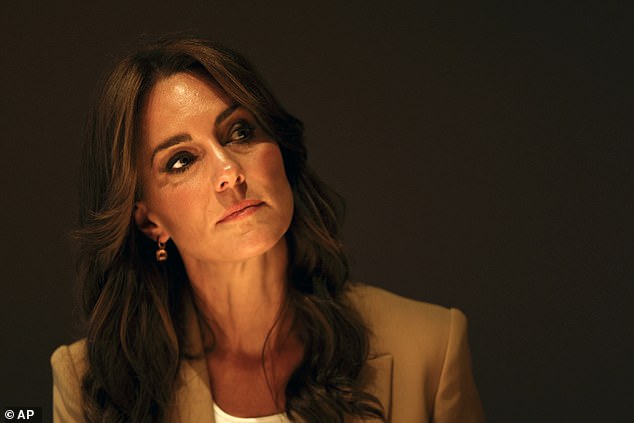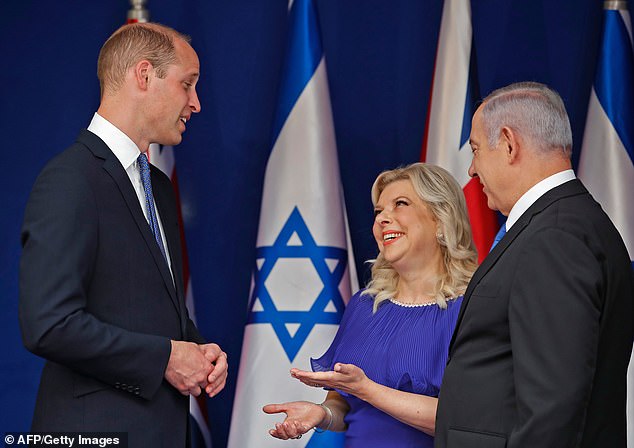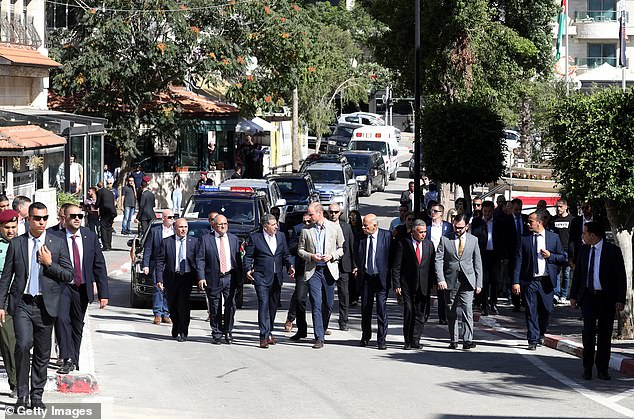RICHARD KAY: I’m told Prince William wants to move away from mere platitudes. If so, we’re heading for dangerous, uncharted waters…
Prince William is by some distance the most popular member of the royal family. And when his stylish wife Catherine is by his side, these approval ratings soar even higher.
This popularity is combined by two inherited – and diametrically opposed – traits: the caution of his grandmother, the late Queen Elizabeth, and the impulsive instincts that came so naturally to his much-missed mother, Princess Diana.
There is the odd lapse in judgment from time to time, but by and large William, unlike his brother Harry, pauses to think before speaking.
Yesterday’s impassioned plea on the war in Gaza suggests that in this battle between heart and head, the dominant influence has suddenly and dramatically shifted in favor of the late princess.
In a few short words, presented against a poignant black background, William provided a vision of the conflict that veered dangerously close to becoming a political and diplomatic minefield.
Prince William is by some distance the most popular member of the royal family
While he did not directly call for a ceasefire, as many on the left might have wanted, his statement was certainly open to that interpretation in the hope of “an end to the fighting as soon as possible.”
He also spoke of “the terrible human consequences of the conflict in the Middle East since the Hamas terrorist attack on October 7.”
This formulation was clumsy.
By referring to the deaths “since” that atrocity, William risked appearing to be excluding the hundreds of Israelis killed by Hamas.
His deeply emotional language – ‘even in the darkest hour we must not succumb to the counsel of despair’ and his determination ‘to hold on to the hope that a better future can be found’ – will clearly appeal to a younger audience, from many of whom support the Palestinians.
Yet this approach is fraught with dangers.
Almost inevitably, the statement sparked immediate hostility online.
“He should not have public opinions on political matters,” one commenter wrote. ‘He is not elected and has no democratic mandate.
‘We elect a government to govern the country. He needs to shut up and take care of the kids.”
Another posted: “Hamas should be dancing for joy because this fool stuck his oar in and became part of their mouthpiece (sic).”
A third warned: “Be careful William. The last monarch who got involved in politics lost his head.”
Most striking of all was this blunt warning: “He should take a leaf out of his grandmother’s book and not comment on political matters.”
While public figures are wary of publicly criticizing the heir to the throne, some compared his intervention to that of Princess Diana during her landmine campaign, when she was forced to deny involvement in party politics and insist she was a “humanitarian.”
Delving into the complexities of the fighting in Gaza is a much more serious approach.
When Diana was criticized for supporting an international treaty banning anti-personnel landmines, she was divorced and stripped of her HRH title.
However, William is not only Prince of Wales and only a stone’s throw from the throne, but also – due to his father’s cancer treatment and lack of royal duties – the de facto ‘alternative’ king.
If he ever needed the late queen’s steadfast approach, it was surely the most intractable problem in geopolitics: the Israeli-Palestinian issue.
And yet here he was, entering the international arena with a statement that quickly made headlines around the world, for all the wrong reasons.

When William’s stylish wife Catherine is by his side, his approval ratings soar even higher
Needless to say, this approach would have been anathema to his grandmother, whose one observation on domestic politics – during the 2014 Scottish referendum debate – caused her significant problems after her views were foolishly leaked by then Prime Minister David Cameron.
How ironic it is that Lord Cameron is now Foreign Secretary, whose office was informed in advance of the prince’s statement.
Charles – who as Prince of Wales was often accused of meddling – has been much more circumspect as monarch.
There has been no repeat of his infamous ‘black spider’ letters to ministers railing about official policy, while his public comments, like those of his mother before him, have always been measured and nuanced. In short, as king he has not put a step wrong.
So what possessed William to undertake this extraordinary intervention? Until recently he has shown little interest in international affairs, confining himself to topics in which he has some expertise: conservation, the environment and saving the planet. His Earthshot Prize has been well received and evokes a spirit of optimism about humanity’s ability to solve global emergencies, not least the climate crisis.
On a smaller scale, he has turned the youthful understanding of homelessness he learned at his mother’s knee into action, pledging to put his own money into building homes.
But it is when he strays from such familiar territory that William has his naivete exposed more than once.

William meets with Israeli Prime Minister Benjamin Netanyahu and his wife Sara in Jerusalem in 2018
A few years ago, even his opponents were willing to blame youthful exuberance for his suggestion that Buckingham Palace’s ivory collection be destroyed.
There was a similar willingness to overlook both his “unfortunate” decision to hunt wild boar a day before he gave a speech on the need to curb illegal poaching, and his awkward visit to a nature reserve in China, apparently unaware that elephants had their feet there. in chains as entertainment for the public.
But after a backlash in 2017, when he inadvertently – and incoherently – entered the drugs debate by asking addicts whether they thought drugs should be legalized, William is said to have learned his lesson and was determined to keep his feisty temper in check.
Until yesterday.
Friends say that William, like so many of us, has not been immune to the horrific photos and videos that have emerged from Gaza since Israel began its operation to root out Hamas.
I’m told he also wants to move away from the platitudes typical of royal pronouncements. If so, we are heading into dangerous uncharted waters. With the king incapacitated, what William does and says is necessarily subject to additional scrutiny.

The prince is escorted by security in Ramallah during his official tour of the Middle East in 2018
Unlike his father, who as Prince of Wales for decades made his position on certain issues clear only after he had thoroughly researched them, William did not have that luxury.
He postponed his start as a full-time working royal for several years, instead prioritizing his family and his career as a helicopter ambulance pilot.
It was a move for which he was widely praised at the time.
And it’s also only fair to point out that William became the first member of the Royal Family to visit the West Bank almost six years ago and was clearly hugely moved and disturbed by what he had seen.
But is pure emotion enough?
Before his own interventions, Charles carefully studied issues close to his heart – from genetically modified foods to mainstream farming methods, education, the inner cities and poverty, the armed forces and alternative medicine.
He met and corresponded with ministers and officials and with many relevant experts.
When he was accused by governments of lack of accountability, he enjoyed the public support his invaders generated.
But in matters of national and international diplomacy, he, like his mother, has been extremely cautious.
How ironic that just a few years ago all the talk before he came to the throne was about Charles determined to rule as a meddlesome monarch.
Instead, he has been an example of prudence and common sense – and it is William whose judgment is being questioned.
